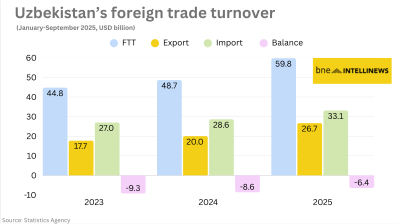On October 27, 2024, Uzbekistan will hold its parliamentary elections, a significant moment in the country’s evolving political trajectory. Under President Shavkat Mirziyoyev, Uzbekistan has embarked on a path of liberalising and modernising its political and economic systems. These elections will serve as a key test for the legitimacy of the reforms, while reshaping the power dynamics among Uzbekistan’s political factions. Here’s a breakdown of the key forces at play in this important electoral contest.
The main political forces at play
Five major political parties are competing in the upcoming elections, the Central Election Commission (CEC) confirmed. While their ideologies vary, all share a commitment to continuing the reforms launched by Mirziyoyev – albeit with their distinct interpretations and priorities.
The People's Democratic Party of Uzbekistan (PDPU): Historically rooted in Uzbekistan’s political fabric, the PDPU is often seen as the successor to the former Soviet Communist Party. It focuses on social welfare and represents the interests of the most vulnerable. Despite its traditional values, the party has adapted its rhetoric to align with the economic and social reforms introduced by the current government.
Liberal Democratic Party of Uzbekistan (O'zLiDeP): The ruling party under Mirziyoyev, O'zLiDeP is viewed as the dominant force in Uzbekistan’s political arena. It advocates for liberal economic reforms, emphasizing entrepreneurship and business development. O'zLiDeP appeals to a pro-business electorate and is seen as the driving force behind the country's economic modernisation.
Social Democratic Party Adolat: Adolat occupies the social-democratic space, advocating for greater equality and social justice. The party supports strengthening the welfare state and protecting the rights of workers and marginalised groups. Adolat seeks to balance the liberal economic reforms with policies that address social disparities and promote democratic reforms.
Democratic Party of National Revival (Milliy Tiklanish): This nationalist party focuses on preserving Uzbekistan’s cultural heritage, traditions and national identity. While supporting political and economic reforms, Milliy Tiklanish appeals to traditional voters, stressing the protection of Uzbekistan’s values in the face of modernisation.
Ecological Party of Uzbekistan: A newcomer to the political scene, the Ecological Party is centred around environmental issues – a growing concern in a country grappling with the impacts of climate change and environmental degradation. The party resonates with younger, urban voters who are increasingly focused on sustainability and environmental protection.
An election marked by constitutional reforms and liberalisation
Since ascending to power in 2016, President Mirziyoyev has introduced sweeping reforms aimed at liberalising the economy, strengthening the rule of law and opening the political system. These efforts were accelerated with the adoption of a new constitution in 2023, which expanded parliamentary powers and introduced a mixed electoral system combining majoritarian and proportional voting.
However, these reforms are not without challenges. While the government seeks to attract foreign investment and stimulate economic growth, it also faces public demands for deeper social reforms. The reforming process created some certain challenges such as the need for guaranteeing the equality and realisation of targeted social programmes, fighting against corruption and the shadow economy. And of course this will be an agenda during the debate between political parties as well.
The October elections will serve as a referendum on these reforms, testing whether the adjustments to the electoral system and governance structures will result in fairer representation and sustained public support for Mirziyoyev’s agenda.
Additionally, the inclusion of newer, more diverse parties like the Ecological Party demonstrates a shift toward a more inclusive political system. These elections may reveal whether Uzbekistan is ready to embrace a more pluralistic political landscape, where multiple voices can influence the country’s direction.
Outlook and challenges
The 2024 elections are seen as a critical barometer for Uzbekistan’s future trajectory. While economic and political reforms have brought greater stability and dynamism to the country, they must deliver tangible results for the population to maintain momentum.
The international community is also closely watching the process, with the presence of international observers underscoring the importance of these elections not only for Uzbekistan but also for its standing on the global stage. Successful elections could further legitimise the reforms and consolidate the country's gradual opening to the world.
One of the most significant challenges will be the ability of opposition parties to organise effectively and assert their influence in the political arena. While the main parties generally support the reform process, key differences remain in how they envision its implementation. These differing perspectives will shape the future political and economic landscape of Uzbekistan.
In sum, the October 27 parliamentary elections represent a pivotal moment for Uzbekistan, marking a crucial step in the reform process initiated by President Mirziyoyev. The elections will test the resilience of the reforms and the maturity of Uzbekistan’s democracy. The outcome will be closely watched as a signal of the country’s direction in the years to come.
Senator Sodiq Safoyev, former Foreign Minister for Uzbekistan, is currently deputy chairman of the country’s parliament.
Opinion

Don’t be fooled, Northern Cyprus’ new president is no opponent of Erdogan, says academic
Turkey’s powers-that-be said to have anticipated that Tufan Erhurman will pose no major threat.

COMMENT: Hungary’s investment slump shows signs of bottoming, but EU tensions still cast a long shadow
Hungary’s economy has fallen behind its Central European peers in recent years, and the root of this underperformance lies in a sharp and protracted collapse in investment. But a possible change of government next year could change things.

IMF: Global economic outlook shows modest change amid policy shifts and complex forces
Dialing down uncertainty, reducing vulnerabilities, and investing in innovation can help deliver durable economic gains.

COMMENT: China’s new export controls are narrower than first appears
A closer inspection suggests that the scope of China’s new controls on rare earths is narrower than many had initially feared. But they still give officials plenty of leverage over global supply chains, according to Capital Economics.




